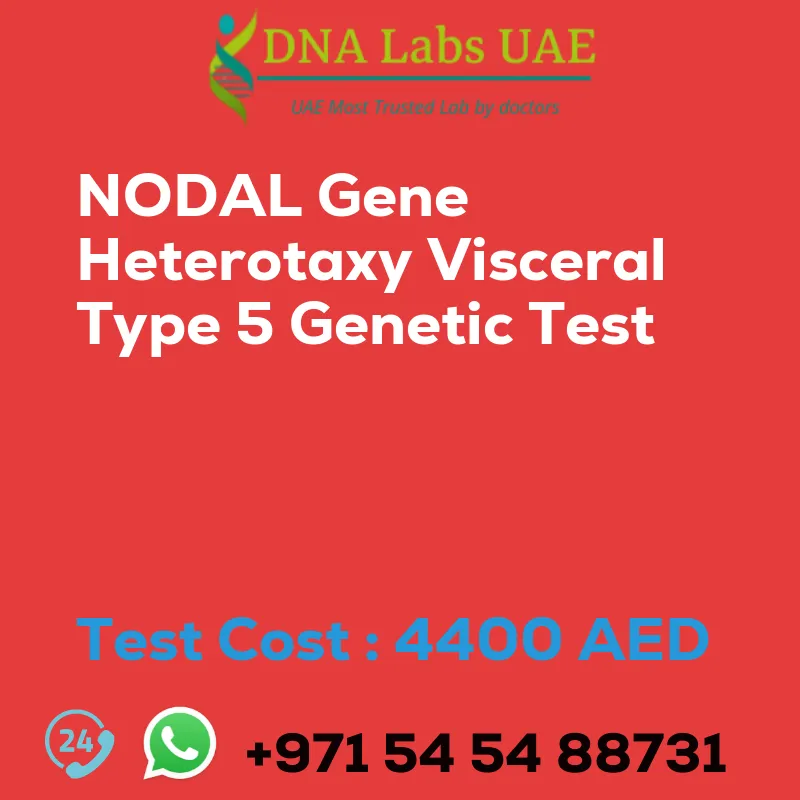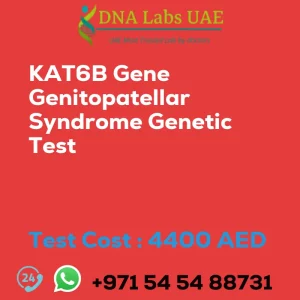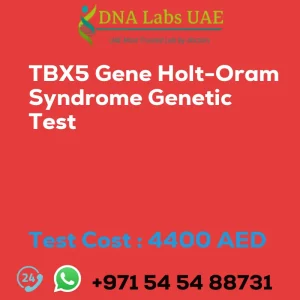NODAL Gene Heterotaxy Visceral Type 5 Genetic Test
Test Name: NODAL Gene Heterotaxy Visceral Type 5 Genetic Test
Components: NGS Technology
Price: 4400.0 AED
Sample Condition: Blood or Extracted DNA or One drop Blood on FTA Card
Report Delivery: 3 to 4 Weeks
Test Type: Dysmorphology
Doctor: Pediatrics
Test Department: Genetics
Pre Test Information: Clinical History of Patient who is going for NODAL Gene Heterotaxy, Visceral Type 5 NGS Genetic DNA Test. A Genetic Counselling session to draw a pedigree chart of family members affected with NODAL Gene Heterotaxy, Visceral Type 5 NGS Genetic DNA Test gene NODAL
Test Details:
NODAL gene heterotaxy, visceral type 5 is a genetic disorder that affects the development and positioning of organs in the body. It is caused by mutations in the NODAL gene, which plays a crucial role in the formation of the body’s left-right asymmetry during embryonic development.
NGS (Next-Generation Sequencing) genetic testing is a type of genetic test that uses advanced sequencing technologies to analyze multiple genes simultaneously. In the case of NODAL gene heterotaxy, visceral type 5, NGS genetic testing can be used to identify mutations or variations in the NODAL gene that may be responsible for the disorder.
NGS genetic testing can provide valuable information about the specific genetic changes associated with NODAL gene heterotaxy, visceral type 5, which can help with diagnosis, prognosis, and genetic counseling. It can also help in identifying potential treatment options or interventions for individuals with this disorder.
It is important to note that NGS genetic testing may not be available in all healthcare settings and may require specialized laboratories or genetic testing facilities. It is typically recommended for individuals with suspected genetic disorders or a family history of the condition.
Genetic counseling is often recommended before and after undergoing NGS genetic testing to help individuals understand the implications of the test results and make informed decisions about their healthcare.
| Test Name | NODAL Gene Heterotaxy visceral type 5 Genetic Test |
|---|---|
| Components | |
| Price | 4400.0 AED |
| Sample Condition | Blood or Extracted DNA or One drop Blood on FTA Card |
| Report Delivery | 3 to 4 Weeks |
| Method | NGS Technology |
| Test type | Dysmorphology |
| Doctor | Pediatrics |
| Test Department: | Genetics |
| Pre Test Information | Clinical History of Patient who is going for NODAL Gene Heterotaxy, visceral type 5 NGS Genetic DNA Test. A Genetic Counselling session to draw a pedigree chart of family members affected with NODAL Gene Heterotaxy, visceral type 5 NGS Genetic DNA Test gene NODAL |
| Test Details |
NODAL gene heterotaxy, visceral type 5 is a genetic disorder that affects the development and positioning of organs in the body. It is caused by mutations in the NODAL gene, which plays a crucial role in the formation of the body’s left-right asymmetry during embryonic development. NGS (Next-Generation Sequencing) genetic testing is a type of genetic test that uses advanced sequencing technologies to analyze multiple genes simultaneously. In the case of NODAL gene heterotaxy, visceral type 5, NGS genetic testing can be used to identify mutations or variations in the NODAL gene that may be responsible for the disorder. NGS genetic testing can provide valuable information about the specific genetic changes associated with NODAL gene heterotaxy, visceral type 5, which can help with diagnosis, prognosis, and genetic counseling. It can also help in identifying potential treatment options or interventions for individuals with this disorder. It is important to note that NGS genetic testing may not be available in all healthcare settings and may require specialized laboratories or genetic testing facilities. It is typically recommended for individuals with suspected genetic disorders or a family history of the condition. Genetic counseling is often recommended before and after undergoing NGS genetic testing to help individuals understand the implications of the test results and make informed decisions about their healthcare. |








